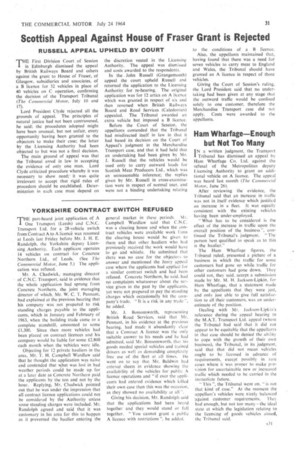YORKSHIRE CONTRACT SWITCH REFUSED T HE part-heard joint application of A
Page 33

If you've noticed an error in this article please click here to report it so we can fix it.
One Transport (Leeds) and C.N.C. Transport Ltd. for a 28-vehicle switch from Contract A to A licence was resumed at Leeds last Friday before Mr. J. H. E. Randolph, the Yorkshire deputy Licensing Authority. Each applicant operates 14 vehicles on contract for Concrete Northern Ltd., of Leeds. (Sec The Commercial Motor, June 5.) The application was refused.
Mr. A. Chadwick; managing director of C.N.C. Transport, said in evidence that the whole application had sprung from Concrete Northern, the joint managing director of which. Mr. W. C. T. Pennant, had explained at the previous hearing that his company, was not prepared to risk standing charges payable to the applicants, which in January and February of 1963, when the building trade came to a complete standstill, amounted to some £1,300. Since then more vehicles had been placed on contract licences and his company would be liable for some £2,800 each month when the vehicles were idle.
Objecting for 12 private hauliers in the area, Mr. T. H. Campbell Wardlaw said that he thought the application was naive and contended that what was lost in bad weather periods could be made up for at a later date as Concrete Northern paid the applicants by the ton and not by the hour. Replying, Mr. Chadwick pointed out that he was under the impression that all contract licence applications could not be considered by the Authority unless some standing charges were included. Mr. Randolph agreed and said that it was customary in his area for this to happen as it prevented the haulier entering the general Market in these periods. Mr. Campbell Wardlaw said that C.N.C. was a clearing house and when the contract vehicles were available work from the clearing house would he given to them and that other hauliers. who had previously received the work would have to go and whistle. He submitted that there was no case for the objectors to answer and mentioned the Jeory appeal ease where the applicants had applied for a similar contract switch and had been refused. Concrete Northern, he said, had no complaints whatsoever about the service given in the past by the applicants, yet were not prepared to pay the standing charges which occasionally hit the company's trade. "It is a risk in any trade he added.
Mr. J. Bossomworth, representing British Road Services, said that Mr. Pennant, in his evidence at the previous hearing, had made it abundantly clear that 'a Contract A licence was the only suitable answer to his needs and he had admitted, said Mr. Bossomworth, that his goods needed special vehicles and trained drivers as well as demanding completely free use of the fleet at all times. He went on to say that Mr. Baldwin had entered sheets in evidence showing the availability of the vehicles for public .A licence operations and "if ever the applicants had entered evidence which killed their own case then this was the occasion, as they showed no availability at all ".
Giving his decision, Mr. Randolph said that the applications had been heard together and they would stand or fall together. "You 'cannot grant a public A licence with restrictions ", he added.
















































































































